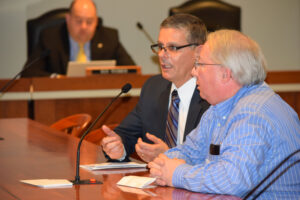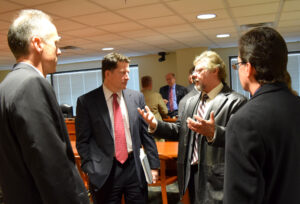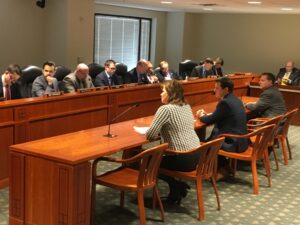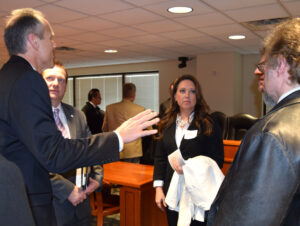(UPDATE: View the League’s new Dark Stores resource web page and view additional Dark Stores-related photos here).
The Michigan Municipal League and some of our members were given the opportunity to offer testify on the Dark Stores tax loophole issue Wednesday before the House Tax Policy Committee. If you’re not aware, the Dark Stores situation involving property tax appeals by Big Box stores like Meijer, Kmart and Wal-mart, is quickly becoming one of the most significant issues, with the biggest implications, facing Michigan communities.
The League testified along with the Michigan Association of Counties and the Michigan Townships Association. We discussed the impact from Dark Store theory of assessment and the need for immediate fixes. We told the committee about the manipulation of property values that big box retailers are perpetrating through the placement of negative use deed restrictions to devalue buildings that they vacate and then point to later on as support for lowering their assessments.
The League has organized a coalition of more than a dozen organizations to take on this issue. View our joint statement previously given to the committee. Along with organizing this coalition, the League is pursuing an aggressive public relations campaign to bring attention to this important issue through radio, television and print media. We urge your assistance with this effort by contacting your Senator and Representative to explain to them the importance of addressing these dark store appeals and restoring a fair and proper valuation system.

Three Rivers City Manager Joseph Bippus and Mayor Thomas Lowry testify on the Dark Stores issue Dec. 9, 2015.
Among those testifying Wednesday were League members Three Rivers Mayor Thomas Lowry and City Manager Joseph Bippus. They testified as guests of State Rep. Aaron Miller, R-Sturgis. Lowry discussed the financial impact of the Dark Stores issue on his city.
“In the last two years we’re pushing well over $300,000 that we had to give back. We only have a $4.3 million budget, we’re approaching 10 percent of (our budget) just from the Dark Store theory,” Lowry told the committee. “We can get an employee for roughly 1 ½ percent of our budget. So for every 1 to 2 percent reduction in our general fund revenues we’re letting an employee go. This absolutely affects the level of services that we can provide to our citizens and our citizens still expect the same level of services.”
In essence, the Dark Store theory is a tax loophole scheme being used by Big Box retailers to lower the amount they pay in property taxes. Retailers such as Meijer, Lowe’s, Target, Kohl’s, Menards, IKEA, Wal-Mart and Home Depot across Michigan are arguing that the market value of their operating store should be based on the sales of similar size “comparable” properties that are vacant and abandoned (aka “dark”) and may not even be located in Michigan. In the last few years, the political appointees on the Michigan Tax Tribunal have upheld this “Dark Store theory” and cut property tax assessments in some cases by as much as 50 percent. This impacts local revenues and subsequently local services and making Michigan one of the only places in the country that assess Big Box retail buildings in this manner. These rulings have resulted in a loss of millions of dollars in tax revenue for local governments across Michigan and now other businesses – not just Big Box stores – such as drug stores and auto repair businesses are attempting to get their taxes lowered based on this same Dark Store argument.

Auburn Hills officials talk with State Rep. Jim Townsend following a House Tax Policy Hearing on the Dark Stores issue Dec. 9, 2015.
Grand Rapids Attorney Jack Van Coevering, former chief judge and chairman of the Michigan Tax Tribunal, testified about how the Michigan Tax Tribunal rulings have resulted in Big Box property tax assessments that are significantly lower in Michigan compared to other states. He gave multiple examples:
- In Michigan, Lowes stores are assessed at $22.10 per square foot. In Lowes home state of North Carolina, the same stores are valued at $79.08 per square foot.
- In Michigan, Menards and Target are valued at $24.97 per square foot. In Menard’s home state of Wisconsin, the sames stores are valued at $61.23 per square foot.
- Sam’s Clubs and Wal-Mart now average around $25.68 per square foot in Michigan. Studies of those buildings in the home state of Arkansas are being done, but Van Coevering said he expects them to be much higher than they are in Michigan.
Van Coevering added that most of the Big Box stores in Michigan used to be valued in the $55 range per square foot and now the amounts have been cut in half due to the Dark Stores theory.
The House Tax Policy committee led by Representative Jeff Farrington, R-Utica, first met on the issue Nov. 4 and scheduled this follow-up hearing after it ran out of time to hear from all those who wanted to speak on the issue. Officials from Auburn Hills were also present and attempted to testify and unfortunately time ran out and they did not get a chance to speak. Instead, they did submit written testimony and those in attendance were recognized by Chairman Farrington. I want to thank the Auburn Hills contingent for their continued work on this issue – Auburn Hills City Manager Thomas Tanghe; Assessor Michael Lohmeier; and City Attorney Derk Berkerleg.
Escanaba Assessor Daina Norden also attended the hearing.
The House Tax Policy committee has established a work group to study the issue. The work group, being led by House Tax Policy Committee Vice-Chair David Maturen, R-Vicksburg, includes representatives from all sides of the issue, including the League. Check out an in-depth radio video interview of Maturen discussing the issue and the workgroup.
Posted by Matt Bach on behalf of Chris Hackbarth, the League’s director of state affairs. Chris can be reached at 517-908-0304 and [email protected].

